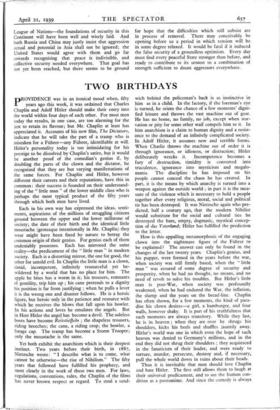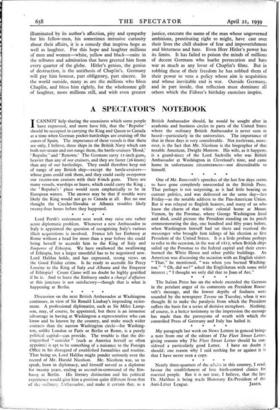TWO BIRTHDAYS
PROVIDENCE was in an ironical mood when, fifty years ago this week, it was ordained that Charles Chaplin and Adolf Hitler should make their entry into the world within four days of each other. For most men today the results, in one case, are too alarming for the jest to retain its flavour; but Mr. Chaplin at least has appreciated it. Accounts of his new film, The Dictators, indicate that he will take the part of a tramp who is mistaken for a Fiihrer—any Fiihrer, identifiable at will. Hitler's personality today is too intimidating for his prestige to be dissolved by Chaplin's satire, but it would be another proof of the comedian's genius if, by doubling the parts of the clown and the dictator, he recognised that they are but varying manifestations of the same forces. For Chaplin and Hitler, however different their careers and their reputations, have this in common: their success is founded on their understand- ing of the "little man" of the lower middle class who is perhaps the most typical product of the fifty years through which both men have lived.
Each in his own way has eipressed the ideas, senti- ments, aspirations of the millions of struggling citizens ground between the upper and the lower millstone of society; the date of their birth and the identical little moustache (grotesque intentionally in Mr. Chaplin) they wear might have been fixed by nature to betray the common origin of their genius. For genius each of them undeniably possesses. Each has mirrored the same reality—the predicament of the "little man" in modern society. Each is a distorting mirror, the one for good, the other for untold evil. In Chaplin the little man is a clown, timid, incompetent, infinitely resourceful yet be- wildered by a world that has no place for him. The apple he bites has a worm in it; his trousers, remnants of gentility, trip him up ; his cane pretends to a dignity his position is far from justifying ; when he pulls a lever it is the wrong one and disaster follows. He is a heroic figure, but heroic only in the patience and resource with which he receives the blows that fall upon his bowler. In his actions and loves he emulates the angels. But in Herr Hitler the angel has become a devil. The soleless boots have become Rettstieffeln ; the shapeless trousers, riding breeches; the cane, a riding crop; the bowler, a forage cap. The tramp has become a Storm Trooper; only the moustache is the same.
Yet both exhibit the anarchism which is their deepest mstinct. Two years before their birth, in 1887, Nietzsche wrote : "I describe what is to come, what cannot be otherwise—the rise of Nihilism." The fifty years that followed have fulfilled his prophecy, and most clearly in the work of these two men. For laws, regulations, conventions, rules, the Chaplin of the films has never known respect or regard. To steal a sand- wich behind the policeman's back is as instinctive in him as in a child. In the factory, if the foreman's eye is turned, he seizes the chance of a few moments' digni- fied leisure and throws the vast machine out of gear. He has no home, no family, no job, except when star- vation or pity for some other waif compels him to it. In him anarchism is a claim to human dignity and a resist- ance to the demand of an infinitely complicated society. In Adolf Hitler, it assumes new and terrible forms. When Charlie throws the machine out of order it is through ignorance, or idleness, or distraction; Hitler deliberately wrecks it. Incompetence becomes a fury of destruction, timidity is converted into truculence, ignorance into mysticism and megalo- mania. The discipline he has imposed on his people cannot conceal the chaos he has created. In part, it is the means by which anarchy is turned into a weapon against the outside world ; in part it is the mea- sure of the violence which is necessary to hold a people together after every religious, moral, social and political tie has been destroyed. It was Nietzsche again who pre- dicted, half a century ago, that the modern Nihilist would substitute for the social and cultural ties he destroyed the bare, empty, dogmatic, mystical concep- tion of das Vaterland; Hitler has fulfilled the prediction to the letter.
How is this appalling metamorphosis of the engaging clown into the nightmare figure of the Fiihrer to be explained? The answer can only be found in the changes of the last twenty years. Chaplin's genius, and his puppet, were formed in the years before the war, when society was still firmly based, when the "little man" was assured of some degree of security and prosperity, when he had no thought, no means, and no need of revolt to solve his troubles. But Hitler's little man is post-War, when society was profoundly weakened, when he had endured the War, the inflation, the slump and the years on the bread-line. Chaplin has often shown, for a few moments, the kind of para- dise his clown desires—a girl, a hamburger, and four walls, however shaky. It is part of his truthfulness that such moments are always transitory. While they last, he is in heaven ; when they are over he shrugs his shoulders, kicks his heels and shuffles jauntily away. Hitler's world was one in which even the hope of such heaven was denied to Germany's millions, and in the end they did not shrug their shoulders ; they acquiesced in the fanaticism of their leader, and were ready to torture, murder, persecute, destroy and, if necessary, pull the whole world down in ruins about their heads.
Thus it is inevitable that men should love Chaplin and hate Hitler. The first still allows them to laugh at their universal predicament, and to see the human con- dition as a pantomime. And since the comedy is always illuminated by its author's affection, pity and sympathy for his fellow-men, his sometimes intrusive curiosity about their affairs, it is a comedy that inspires hope as well as laughter. For this hope and laughter millions of men and women—white, yellow and black—unite in the tributes and admiration that have greeted him from every quarter of the globe. Hitler's genius, the genius of destruction, is the antithesis of Chaplin's. Germany will pay him honour, part obligatory, part sincere. In the world outside, many as are the millions who bless Chaplin, and bless him rightly, for the wholesome gift of laughter, more millions still, and with even greater justice, execrate the name of the man whose ungoverned ambitions, prostituting right to might, have cast over their lives the chill shadow of fear and impoverishment and bitterness and hate. Even Herr Hitler's power has its limits. It has failed to poison the minds of millions of decent Germans who loathe persecution and hate war as much as any lover of Chaplin's films. But in robbing these of their freedom he has robbed them of their power to veto a policy whose aim is acquisition and whose inevitable end is war. Outside Germany, and in part inside, that reflection must dominate all others which the Fiihrer's birthday exercises inspire.











































 Previous page
Previous page